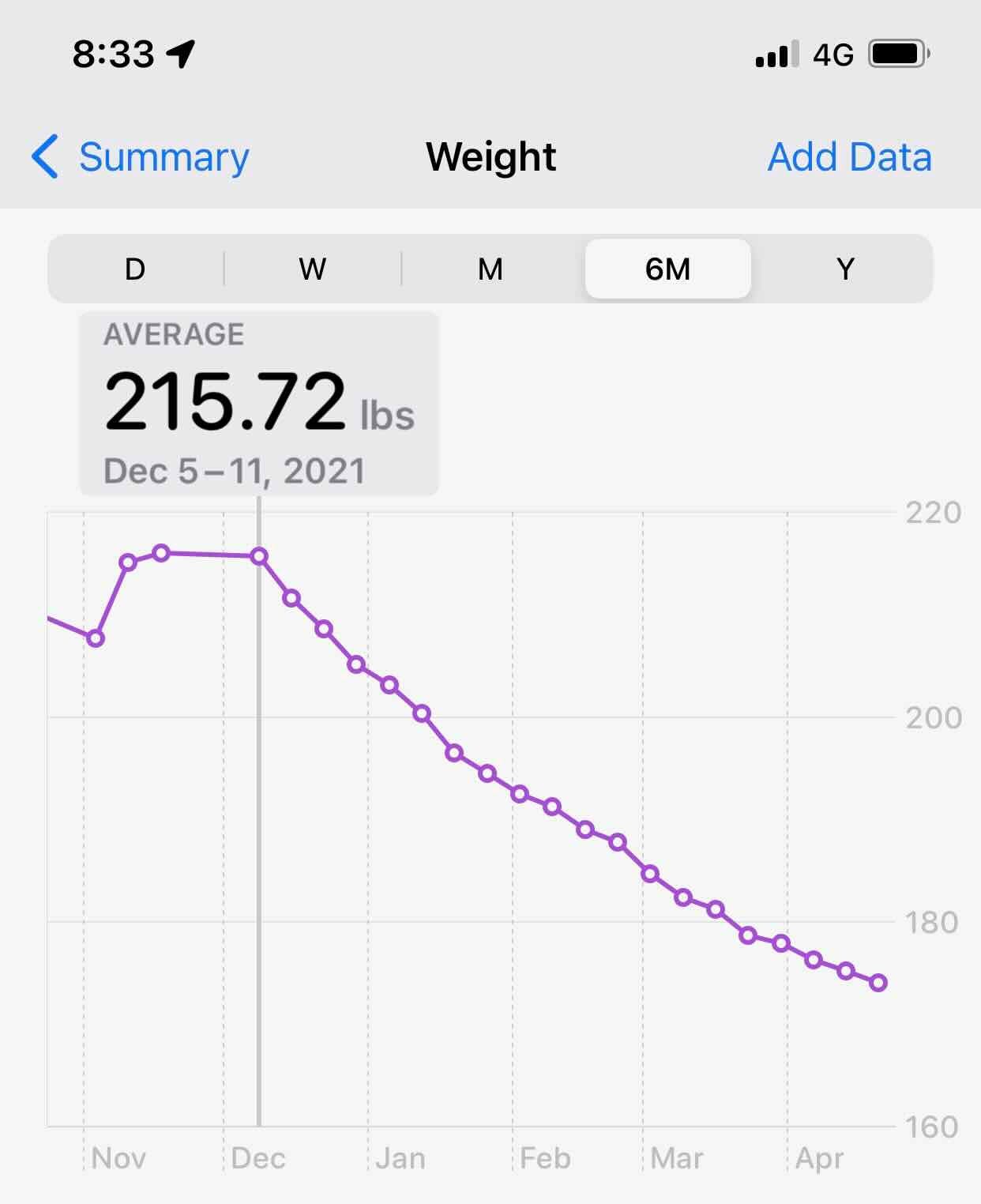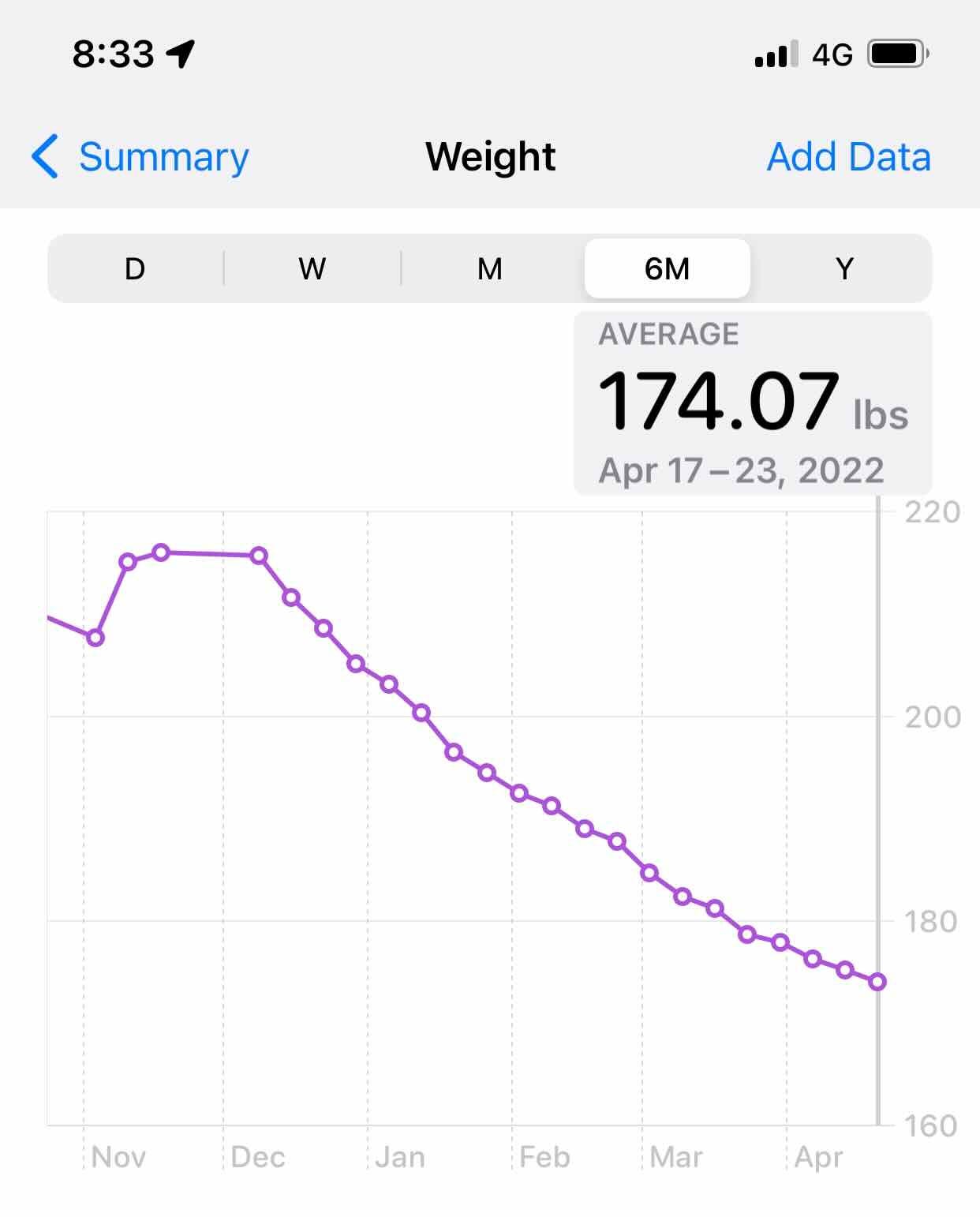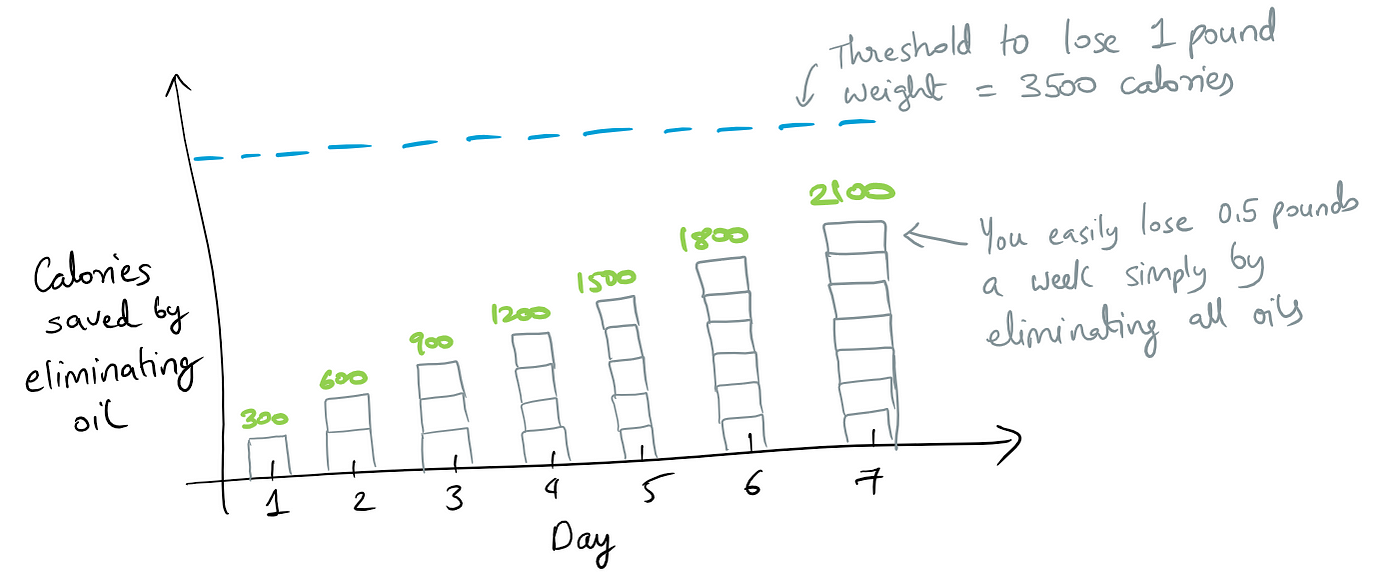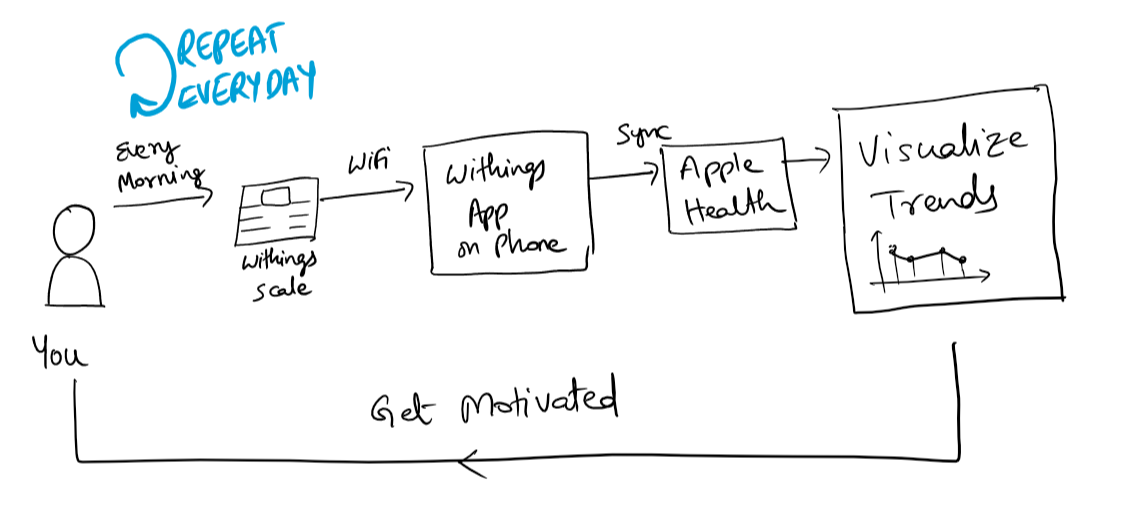[ad_1]
Surprising lessons learnt by finally losing 45 pounds in 4 months
Here is the situation.
You have been a vegetarian most of your life.
And yet you have been overweight.
You simply cannot understand what you are doing wrong — you are eating (what you thought was) healthy, getting a moderate amount of exercise — but nothing is working when it comes to helping you achieve an ideal BMI of less than 25 consistently.
Multiple studies have shown that being in a healthy weight range leads to normalized blood pressure, better sugar control, reduced pressure on your joints (leading to less risk of arthritis), lower blood cholesterol, reduced heart disease and so many other health benefits.
You have realized this and have committed to reducing your weight to a normal BMI of 25 or less.
The added weight, if not addressed soon, has the potential to lead to other risk factors.
If you recently transitioned to eating vegetarian, then you likely did so because every health article that you have read has categorically stated that you need to eliminate animal protein — especially meat — and focus on eating vegetarian food.
From the moment you realized this, you have diligently followed a vegetarian diet. You have painstakingly ignored every sumptuous beef or chicken meal & you have taken great pains to nurture yourself with wholewheat bread, rice and other healthy vegetarian foods … but, despite doing this for many years if not decades, you are frustrated to see yourself overweight but more importantly, you are puzzled what else you can do to attain a healthy weight and avoid all the health complications that come with being overweight over a long time.
Let me help you.
I was in a similar situation. Finally, fed up with the risks of increased complications caused largely by being overweight, I decided to no longer postpone prioritizing my health — back in Dec 2021, I aimed to take affirmative action to reduce my weight. I hoped that if I did that, it would also bring my other complications to manageable levels.
Now it’s Apr 2022 and I have lost 40 pounds.


In this article, I will share the biggest secrets I learned.
Disclaimer: This advice should not be seen as a replacement for consulting your doctor/GP/physician, especially if you are taking medications.
All oils contain 120 calories per tablespoon. (Source)
It has been estimated that people usually eat about 3 tablespoons of oil every day.
This is about 360 calories. Even if you eat very healthily, such as steamed green vegetables, adding 360 calories worth of oil on top for dressings, seasoning etc. can easily make you go over the total calorie limit each day if your intention is weight loss.
Adding 3 tablespoons of oil each day adds up to ~110,000 calories each year.
An extra 300 calories from oil each day is equivalent to 300 extra pounds of fat in 10 years.
Oils are not a significant source of vitamins and minerals — eliminate them and get simultaneous weight loss benefits as well as getting much more vitamins and minerals from vegetables.

I could not perceive any taste difference in cooking onions with water instead of oil. And every meal I save about 120–240 calories by using water instead of oil. If I usually eat meals 2 times a day with oil (assume I don’t have an oily breakfast), then I have saved anywhere from 200–400 calories by this change alone. That is 1400–2800 calories saved in a week. To lose a pound of weight, I need a caloric difference of 3500 in a week. Eliminating oil alone and not doing any other change will result in ~1 pound per week weight loss!
FAQ #1: But how will I saute my onions (that my recipe calls for) without oil?
A: Learn to water-saute. Put 3 tablespoons of water into a hot skillet, then put the diced onions. Saute for 3–5 minutes. Add additional tablespoon of water if needed if it dries out. Stir the onions periodically to prevent sticking to the bottom. If it does, dont worry — just put a table spoon of water and swish your spatula on top of the browning to pick up the caramelization. After this point, continue other steps in your recipe as normal.
FAQ #2: How will I cook spices without oil?
A: Dry roast the spices. E.g. if i need to add mustard seeds (a common ingredient in Indian cooking), instead of adding oil and then adding mustard seeds (a traditional step), I simply heat a pan to medium-high temperature and then add the mustard seeds. It starts ‘popping’ as one would expect, without oil. Then I continue with the rest of the recipe. Do the same for cumin seeds, cashew etc.
Bonus Tip: You do not have to construct brand-new recipes just to follow this step. Use your existing recipes, just replace/eliminate the oil that it calls for, and simply water-saute or day-saute instead.
Note: It’s important to note that we are not aiming to achieve a total elimination of all fats here.
We are only removing concentrated facts such as oils.
Quite a lot of weight loss programs recommend eating salads and green leafy vegetables.
However, in my experience, whilst that is correct advice, the problem I had to deal with was one of satiety.
Irrespective of how many cups of steamed kale I ate every day, I could not feel satiated. I always felt hungry after about 1 or 2 hours after every such meal.
The key discovery was when I found out that beans (& to a lesser degree, lentils) contain something called resistant starch.
Resistant starch helps me feel fuller for longer, while at the same time fewer calories being able to be absorbed by my body from such foods.
For example, black beans contain 5% resistant starch, as compared to potatoes which contain less than 1% resistant starch. (Source)
As soon as I started eating 1 cup of cooked beans (black beans, red kidney beans etc.), the hunger pangs went away and I was able to consistently lose weight.
Q: But if I eat beans, it causes constipation/flatulence.
A: The formula for adding anything with fiber is to start small. I introduced beans gradually e.g. 2 tablespoons for 1 week, then increased this to 1/4 cup for 2nd week … and so on. Starting small and gradual, slow increase in quantity is the secret to success here. This allows your digestive system to get used to processing beans gradually. Your gut bacteria evolve accordingly to be able to handle digesting beans.
Many health articles simply state that you had to eat more beans. But they don’t show you some simple recipes which help you to do this as quickly as possible.
Let me change that.
In YouTtube, I have created a playlist that I will continually keep updated with new recipes that I discover for beans and legumes. These are recipes that I have personally tried myself. Note that these recipes may recommend adding oil. You simply need to skip that step and follow the remaining steps as described in the “eliminate oil” section above.
https://www.youtube.com/playlist?list=PLw3DK947hHVCpUfVdc34omUfj8tCkhpOS
Being able to visualize your progress is a huge motivation to keep going.
But — the process of measuring your weight — and then entering that number manually into an app or book was very cumbersome to me.
So I invested in a weighing scale which automatically sent my weight via WiFi to my phone app.
The phone app then sent the same data to Apple Health, also on my phone, and I used Apple Health as the one-stop-shop for all things health-related.
Apple Health automatically calculates weight trends, such as last-1–week weight trend, last month’s trend etc. and sends you encouraging messages.

All I have to do is to stand on the weighing scale in the morning each day. I complete my morning activities and weigh myself before eating or drinking anything in the morning.
The weighing scale I use is Withings Body Cardio.
https://www.withings.com/uk/en/body-cardio
The reason for choosing this particular scale is that it has a rechargeable battery (whereas others have AA battery). If you are looking for a more cost effective option, look for any scale that offers wifi and Apple Health integration.
Taking a naturally occurring food product and pulverizing it into a flour is increasing its surface area by many thousands of times.
This increase in surface area, which isn’t what the nature intended, results in highly concentrated calories being ingested into your body which in-turn results in skyrocketing increase in blood sugars and associated insulin. All of this results in additional fat storage.
The secret is to reduce (and if possible totally eliminate, although this may be difficult to do as a beginner) such foods and instead rely on eating whole foods.
As an example, instead of eating bread (highly concentrated calories due to vastly increased surface area as a result of grinding grains into flour), eat whole foods such as sweet potato with the skin on. The skin helps in a slower and gradual release of calories into your body.
Instead of pulverizing berries into a smoothie, wash and eat the berries instead. Doing so retains the fibre as-is. “Smoothie-ing” this would result in the fibre particles being broken down into millions of pieces, resulting in it being digested faster (and you feeling hungrier sooner).

Ask yourself — “Does the thing I am currently eating exist in nature in the powdered form that I see in front of me?” — if the answer is No, then try to avoid it if possible or reduce its consumption. The only exception to this are ground spices … which we consume in very less quantities … and hence isn’t usually a consideration for weight loss.
Nature has found a way to design food in such a way that balances carbohydrate, fat, protein and fiber. If we eat things as nature intended, we stand a greater chance of controlling the yo-yoing of energy & hunger that we experience if we eat processed food.
The basic rule is that when you are not awake and moving about (e.g. lets say from 8AM to 7PM), you should aim to not eat highly concentrated calories.
Because you will be physically active during the day (even if that’s just standing in your house cleaning it, doing dishes or simple household work … does not necessarily have to be exercise), any calories you eat for breakfast and lunch typically will be used for supporting your muscles with the energy they require.
But, during night, when physical activity is less or near zero, any extra intake of calories simply gets stored as fat.
For this reason, do not have large amounts of food in your stomach when you go to sleep. Food usually takes anywhere between 1–4 hours to fully digest. For optimal weight loss, eat foods that are gentle on your stomach such as steamed green vegetables or a banana — they must give some carbohydrates so that your overnight blood sugar levels remain stable and at the same time should not be high in calories or take a long time to digest.
If you are still digesting food when your head hits the pillow, then not only will you find it difficult to sleep because your digestive system is generating heat trying to digest the food, but your body will also not end up burning the existing fat in your body — that step is crucial for weight loss.
I purchased a course and Paid $300 for it.
In it, this video, freely available on youtube, was listed in a appendix section.
I consider this video alone worth the price of the course.
Watch this video from start to finish to understand the concept of calorie density and how that plays a role in weight loss.
I had always viewed researching nutrition and cooking at home as tasks that I could easily outsource to someone else.
I did that for 10 years, continuously eating from takeaways and restaurants. It wreaked havoc on my day to day energy levels and health.
Adopt a mindset that continually researching good food to eat and spending time preparing such food is the best way you can take care of yourself and your family.
This step cannot be outsourced. Even though many apps and services have cropped up which ship meals to your home or make the preparation easier by shipping only ingredients, I have found that they are very high in oil, salt, sugar and calories or are otherwise nutritionally not balanced.
Take control of your health by learning to cook at home. It will be difficult at first but as time goes on, you will find it easier and your home food will taste 100 times better than eating outside. More importantly, you will know that by cooking at home and controlling the ingredients, you have done everything possible in your power to improve your health. This satisfaction alone will cause wonders in your life.
I will continue to write additional articles to share additional tips and techniques specifically for vegetarians who are overweight.
Continue to follow me and look out for these stories in the future.
All the best in your effort to lose weight and consistently maintain a healthy weight over a long period of time.
Please let me know in the comments what other strategies you have used successfully and I would love to follow them myself.
[ad_2]
Source link




